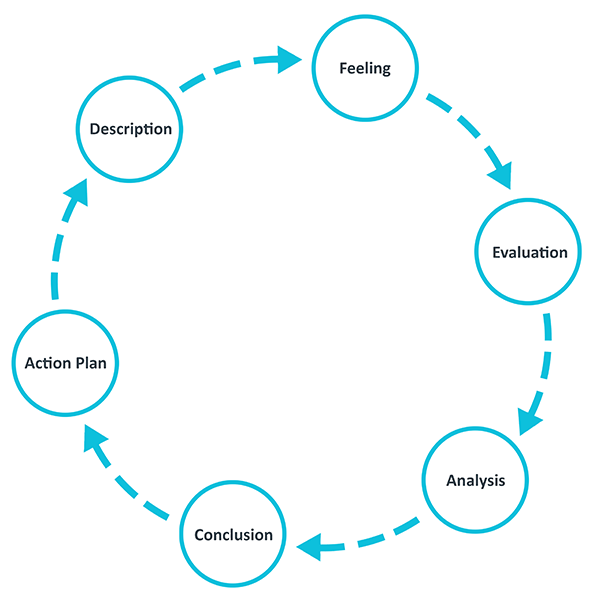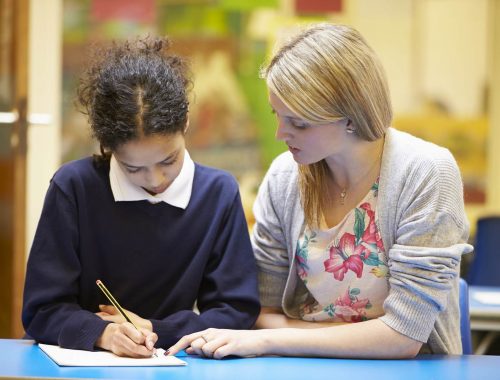Under Pressure (Pushing Down On Me)
Securing a work placement – what a joyful experience. From the stress of waiting on responses from employers, the rejections, and my personal favourite, the ‘oh, what if I do not get a placement in time?’ narrative constantly running through your mind like a broken record that just does not want to stop. Fun, right?
These feelings can ultimately be felt by many when they are trying to attain a work placement. However, even though these experiences can be challenging, they are also needed. I was fortunate to be given the opportunity to secure a work placement through my work-based learning module offered at Queen’s University Belfast. This blog will explore these experiences using Gibb’s reflective cycle, exploring the challenges that came with securing a placement, along with the lessons learnt during this process. [1]

So… what happened?
As I plan to go into teaching after I graduate, I wanted to gain some relevant work experience as it is supposed to “prepare students for work and allow them to develop general business awareness” (UCAS, 2019) [2]. To gain this experience, I would have to secure a placement. In the beginning of my applications in August, I only applied to secondary schools, as I believed that a secondary school was the only place I could get relevant work experience for teaching. It took a lengthy amount of time for employers to reply, and, as placements were not guaranteed, I faced rejections from several schools. In the end, I applied to do work experience at the South Eastern Regional College after deciding that any type of experience was better than none. Thankfully, I managed to secure my placement at SERC.
Facing the Great War of feelings: what type of feelings did I experience?
As you can imagine, I was very stressed out and anxious. I did not know if I was going to secure a placement in time. If I could not, I would miss out on valuable work experience that I desperately needed to become a teacher, which had been my dream career since I was a child. Additionally, I felt dejected. Deep down, I worried that I was not good enough for any of these placements, and the fact that I kept getting rejected was a sign. However, when I was finally accepted at SERC, I was relieved and excited.
The good, the bad, and the ugly: what was good and what was bad about this experience?
This process taught me that I could work in stressful situations, as I was able to eventually secure a placement at SERC. Additionally, as I was dealing with rejections, it meant I became better at facing them as time went on. As Kevin Feige says, “rejection is a common occurrence. Learning that early and often will help you build up the tolerance and resistance to keep going and keep trying” [3]. However, I did not leave myself enough time to complete this task, which meant that the process for securing a placement became stressful. Additionally, I failed to keep my options open in the beginning which meant that more pressure was placed on me to secure a placement.
Making sense of the situation
This process taught me that you should always leave yourself plenty of time to complete tasks. According to Dr Karl Albrecht, who completed a theory on the different types of stress, “time stress can quickly make you feel unhappy, trapped, or even hopeless” [4]. Ultimately, this explains why I felt stressed and quite hopeless within the situation, as I was not leaving myself enough time to secure a placement. Furthermore, the process could have gone smoother if I had kept my options open. Going into this process, I believed that I had to secure a placement in a secondary school. However, this added more pressure, as it meant that I was not keeping my options open, and I was going in with the idea that only certain type of experiences were valuable. However, even in the face of rejection, I was able to secure a placement, and this was definitely due to the fact that I was eager to get experience so I could be another step closer to achieving my dream.
Taking accountability: what else could I have done?
Instead of leaving things until August, I should have started to contact schools in May or June. That way, I would not have felt so pressured for time, and therefore would not have worried as much about securing a placement. Additionally, instead of simply limiting myself to secondary schools, I should have done a better job at researching how other institutions, such as colleges, could provide me with valuable experience. This would have given me more options, and I would not have been as worried.
“It is not in the stars to hold our destiny but in ourselves” – my future plan of action
In the future, I will leave as much time as possible to organise a placement. This way, I will not feel as stressed when it comes to organising work experience. Additionally, I will keep my options open, and consider how, even if the institution is not a secondary school, it can still provide me with valuable experience about the education sector.
References
[1] The University of Edinburgh. (2020) Gibbs’ Reflective Cycle. Available at Gibbs’ Reflective Cycle | The University of Edinburgh. (Accessed: 28th November 2022).
[2] UCAS. (2019). Is Work Experience Important? Available at https://www.ucas.com/connect/blogs/work-experience-important. (Accessed: 29th November 2022).
[3] Quote. org (2017). Kevin Fiege Quotes. Available at Kevin Feige – Inspiring quotes at Quote.org
[4] Mind Tools (2020). Albrecht’s Four Types of Stress. Available at Albrecht’s Four Types of Stress – Managing Common Pressures (mindtools.com) (Accessed 29th November 2022).
Sources
Gibbs, G. (1988). Learning by doing: A guide to teaching and learning methods. London: Further Education Unit.
UCAS. (2019). Is Work Experience Important? (Accessed: 29th November 2022).
Mind Tools (2020). Albrecht’s Four Types of Stress. (Accessed: 30th November 2022).
Quote. org (2017). Kevin Fiege Quotes. (Accessed 30th November 2022).
Expectations and Reality
You May Also Like

Challenge Accepted Sir!
18 April 2023
The World of Theatre upon Reflection
30 November 2022
